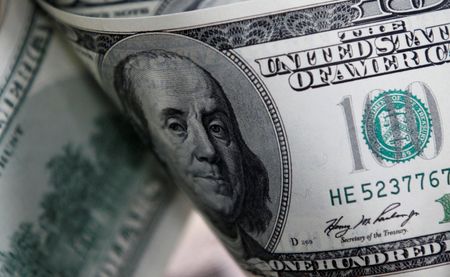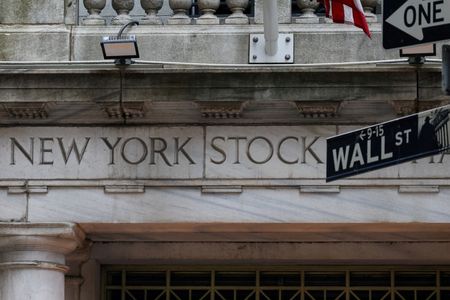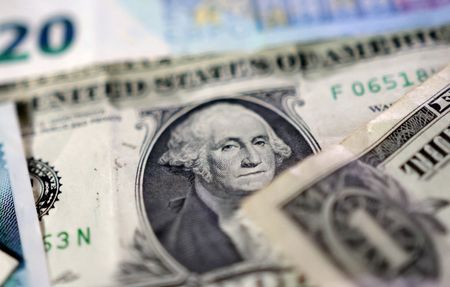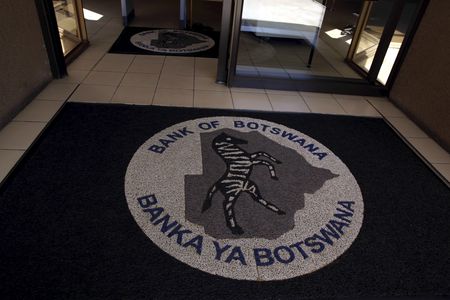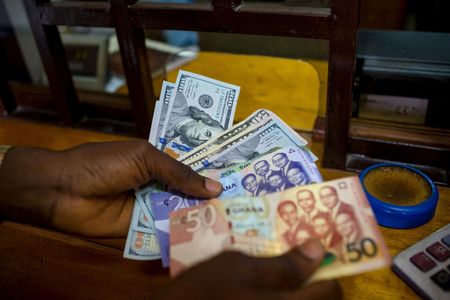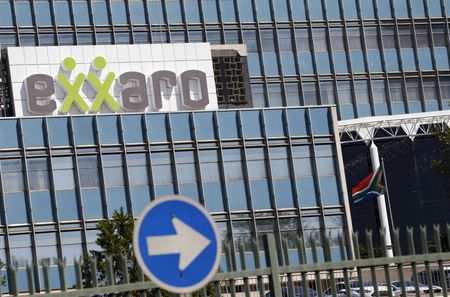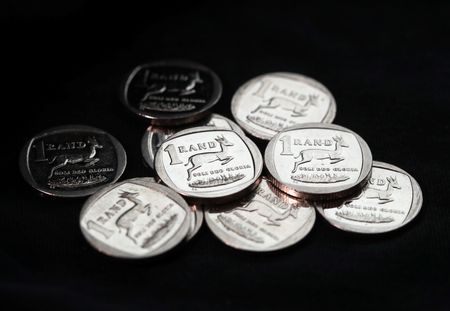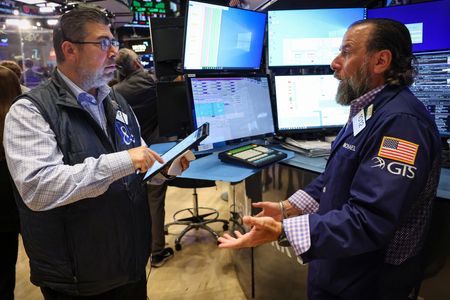By Chris Prentice and Elizabeth Howcroft
NEW YORK/PARIS (Reuters) -Global equities were lower and gold prices eased on Thursday, as traders avoided making big moves and waited for the Federal Reserve’s three-day annual Jackson Hole symposium.
The symposium starts on Thursday and the focus will be on Fed Chair Jerome Powell’s speech on Friday as traders look for hints about the likelihood of a September U.S. rate cut. U.S. Treasury yields inched higher as the meeting kicked off. [US/]
Oil futures advanced, bolstered by signs of strong U.S. demand and uncertainty over efforts to end the war in Ukraine.
The U.S. dollar also gained, adding 0.35% against a basket of other currencies.
Stocks stayed near recent highs during Asian trading, and Australia’s benchmark hit a new record. But European and U.S. markets were under pressure, and the MSCI World Equity Index retreated 0.21%.
“People are sitting on their hands. You have a couple of big known unknowns coming, with Jackson Hole tomorrow and the Fed in September,” said Tim Graf, head of macro strategy for EMEA at State Street Markets.
“This is the time to send the message, if you’re going to ease, that it’s coming,” he said. “But I can also see them saying, we don’t know the full effect of tariffs and inflation pressure is still not quite out of the economy, and being a bit more balanced.”
On Wall Street, the S&P 500 was down 0.17%, the Dow Jones Industrial Average fell 0.24% and the Nasdaq Composite eased 0.07%.
Traders had ramped up bets for a September cut following a surprisingly weak payrolls report at the start of this month, and were further encouraged after consumer price data showed limited upward pressure from tariffs.
But they lowered their expectations slightly following the release of minutes from the Fed’s July meeting. By Thursday, markets were pricing in a 79.6% chance of a September rate cut, compared to 83% on Wednesday, according to LSEG data.
The pan-European STOXX 600 lost 0.04%.
Analysts attributed a pullback in tech stocks this week to concerns that AI investments were not delivering returns.
Euro zone business activity accelerated in August, PMI data showed, with Germany registering its fastest growth since March and France’s downturn easing.
Euro zone bond yields were mostly higher, with the benchmark 10-year German Bund up 2.5 basis points at 2.751%.
The 10-year U.S. Treasury yield rose 3.7 basis points to 4.334%.
The euro was down 0.32% at $1.1614.
U.S. President Donald Trump intensified his effort to influence the Fed on Wednesday, calling on Governor Lisa Cook to resign on the basis of allegations made by one of his political allies about mortgages she holds in Michigan and Georgia. Cook said she had “no intention of being bullied to step down” from her position at the central bank.
Deutsche Bank analysts in a research note attributed a rise in gold overnight to renewed concerns about the Fed’s independence.
“The news was a reminder of the lingering concerns over future Fed independence and risks of fiscal dominance, though the extent of the market reaction was fairly modest,” Deutsche Bank said.
State Street Markets’ Tim Graf said that although central bank independence was considered “sacrosanct” by markets, it was not yet problematic.
“Markets quite rightly look through this, price maybe a little bit of risk premium for sure, but it’s not something that I think really upsets the apple cart too much,” he said.
Spot gold prices edged lower, down 0.09% at $3,343.69 per ounce, while gold futures added 0.01%.
Elsewhere in commodities, Brent oil futures rose 0.49% to $67.17 per barrel and U.S. crude gained 0.48% to $63.01.
(Reporting by Chris Prentice in New York and Elizabeth Howcroft in Paris. Editing by Sharon Singleton and Mark Potter)

